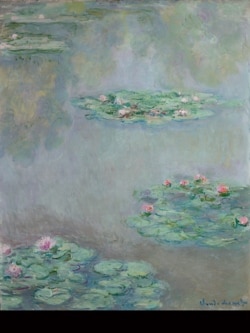The famous gardens of French painter Claude Monet reopened to the public this week, as France lifts its coronavirus restrictions.
The gardens are in Giverny, about 70 kilometers outside Paris. They are where Monet created his best-known works, including “Water Lilies.” More than 500,000 people visit each year to walk the pathways where Monet set up his easel and painted great works of Impressionist art.
Most visitors come in the spring when the painter’s large and colorful gardens are in full bloom. This spring, however, the gardens bloomed only for garden workers.
France remains closed to international visitors, so t he reopening of the gardens lets French people experience them as few ever have: without crowds.
Groups are not permitted, and individuals must keep social distance. The pathways are one-way. And everyone must wear face coverings.
Jean-Marie Avisard is the head gardener at Monet’s gardens. He has worked there for 32 years.
“At this time of the year we normally welcome 4,000 to 5,000 people a day,” Avisard said. “Now we can have 900 persons.”
He added, “We are very happy to show what we do... People will see the garden a bit like on a private visit.”
Seventy-three-year old Jerome Blanchet was pleased to see the gardens without the crowds.
“We are seeing it [the garden] in exceptional conditions,” he said.
Another visitor, Parisian Roberto Vellutini, agreed.
“There are not a lot of people…Today is perfect,” he said.
Claude Monet bought the Giverny farmhouse for his family in 1883. He lived there until his death in 1926.
He changed the house into a colorful mansion, and filled the grounds around it with every flower that would grow in the local climate, including thousands of roses. He built a Japanese-style water lily garden with a small, green bridge. There, he painted one great work of art after another.
After World War II ended, the house and gardens were left empty. In the 1970s, however, they were restored to look exactly how Monet had built them.
The property was opened to the public in the 1980s. Last year, it welcomed 717,271 visitors. Almost 50 percent were international visitors.
I’m Susan Shand.
The Reuters News Agency reported this story. Susan Shand adapted it for Learning English. Ashley Thompson was the editor.
________________________________________________________________
Words in This Story
garden – n. the place where flowers and vegetables are grown
water lily – n. a type of flower that grows in pond water
impressionist - adj. a style of 20th century painting that blurred images
bloom – v. the moment when a flower opens up and reaches perfection
mansion – n. the large house of a rich person






